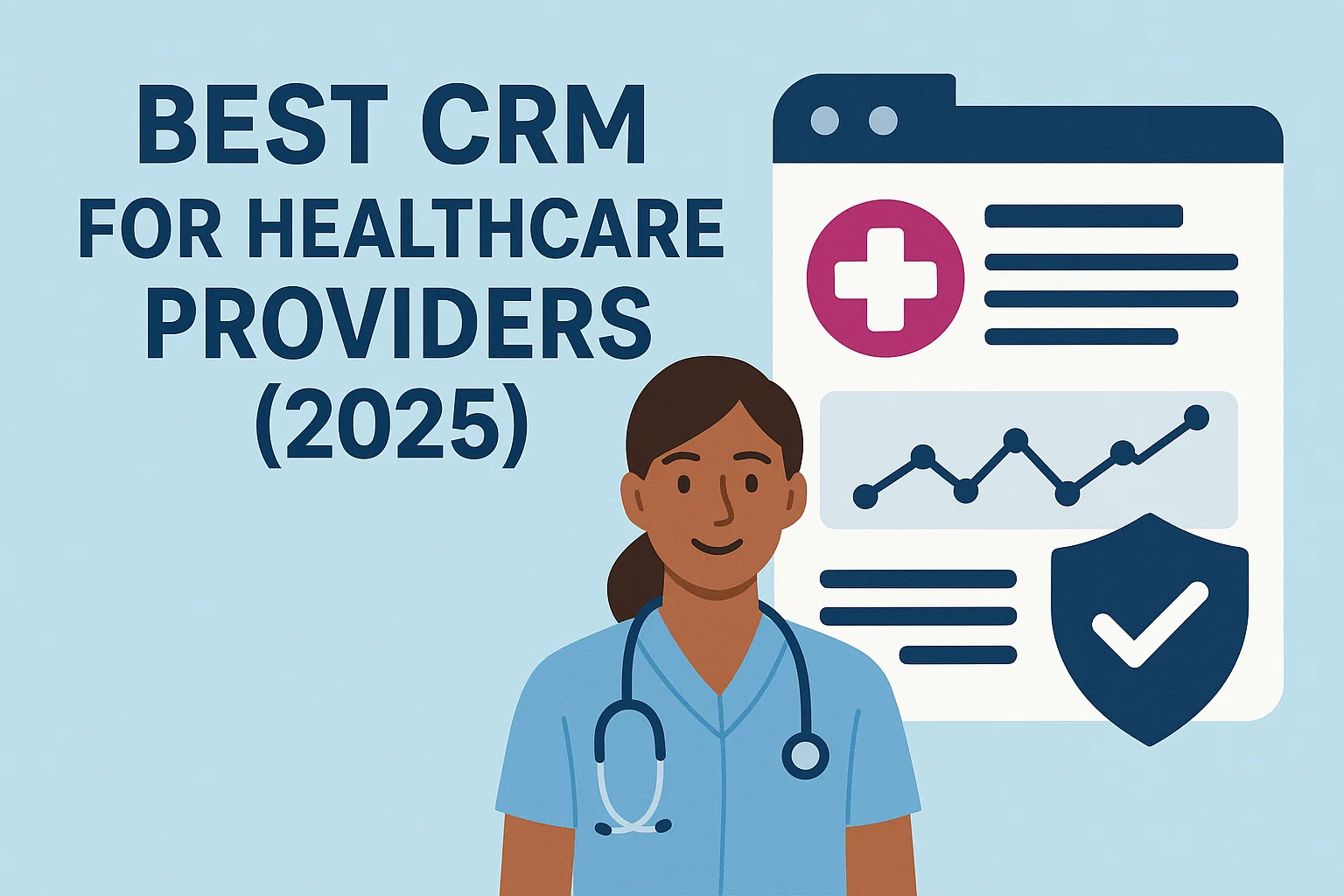Best CRM for Healthcare Providers (2025)

Best CRM for Healthcare Providers (2025)
Healthcare is undergoing a massive digital transformation, and one of the biggest shifts is the adoption of HIPAA-compliant healthcare CRMs. From patient engagement to clinical data management, hospitals, private practices, and healthcare startups across Tier 1 countries like the United States, United Kingdom, Canada, and Germany are leveraging healthcare CRM software to maximize efficiency, improve patient satisfaction, and ensure regulatory compliance.
Why Healthcare Providers Need a CRM in 2025
Unlike traditional CRMs used in sales and marketing, medical CRM software is tailored for healthcare workflows. These platforms provide:
- HIPAA Compliance: Ensures patient data privacy and meets U.S. federal regulations.
- Patient Engagement: Personalized communication through emails, SMS, and patient portals.
- Data Integration: Seamless sync with EMR (Electronic Medical Records) and EHR (Electronic Health Records) systems.
- Automation: Automated appointment reminders, follow-ups, and care management workflows.
- Analytics: AI-driven insights into patient behavior, treatment success rates, and resource allocation.
Key Features of a HIPAA-Compliant CRM
When evaluating the best healthcare CRM, providers should prioritize features that directly impact patient care and compliance:
| Feature | Importance | Benefit for Healthcare Providers |
|---|---|---|
| Data Encryption | High | Protects patient records from breaches |
| EMR/EHR Integration | High | Centralizes patient data in one secure system |
| HIPAA Compliance Tools | Critical | Ensures legal data protection standards |
| AI-Powered Analytics | Medium | Improves diagnosis accuracy and patient outcomes |
| Patient Portals | High | Boosts engagement and satisfaction |
Top Healthcare CRM Software in 2025
Here are the leading HIPAA-compliant healthcare CRM platforms that are dominating the market in 2025:
- Salesforce Health Cloud: Industry-leading CRM with deep healthcare integrations, HIPAA compliance, and AI-powered insights.
- Zoho CRM for Healthcare: Affordable solution for clinics and mid-sized healthcare providers with customization options.
- Microsoft Dynamics 365 Healthcare: Offers predictive analytics, patient management, and seamless EMR/EHR integrations.
- HubSpot Healthcare CRM: Known for patient engagement automation and secure communication workflows.
- Zendesk for Healthcare: Focuses on patient support and care coordination with HIPAA compliance.
AI and Automation in Healthcare CRM
Artificial Intelligence and automation are reshaping healthcare CRMs in 2025. Key AI-driven innovations include:
- Predictive Healthcare Analytics: Helps providers identify high-risk patients early.
- Chatbots for Patient Support: Automates FAQs, appointment scheduling, and medication reminders.
- Smart Marketing Automation: Improves outreach for wellness programs and preventive care.
- Resource Optimization: Ensures better staff allocation and cost reduction.
Cost of Implementing a Healthcare CRM
CRM implementation costs vary depending on size and features. For Tier 1 countries:
| Type of Provider | Estimated Cost (Monthly) | Best Options |
|---|---|---|
| Small Clinic | $50 - $200 | Zoho CRM, HubSpot CRM |
| Mid-Sized Practice | $200 - $600 | Microsoft Dynamics 365, Zendesk |
| Large Hospital Network | $600+ | Salesforce Health Cloud |
HIPAA Compliance: A Non-Negotiable Factor
Healthcare providers in the United States must comply with HIPAA (Health Insurance Portability and Accountability Act). Using a non-compliant CRM can lead to hefty fines, data breaches, and loss of patient trust. Always verify:
- Data encryption at rest and in transit
- Audit logs and access control
- Business Associate Agreements (BAA) from vendors
- Regular security updates and certifications
Future Trends in Healthcare CRM (2025 & Beyond)
As healthcare continues to digitize, expect the following trends:
- Integration with Telemedicine: CRMs will fully support video consultations and remote monitoring.
- Wearable Device Integration: Syncing patient health data from smart devices into CRMs.
- Blockchain in Healthcare CRM: Enhanced data security and transparent patient records.
- Personalized Care Plans: AI will deliver real-time recommendations for treatment options.
Conclusion
The best CRM for healthcare providers in 2025 is one that balances HIPAA compliance, data security, and patient engagement. With platforms like Salesforce Health Cloud, Microsoft Dynamics, and Zoho CRM, providers can improve workflows, build patient trust, and achieve higher ROI. For Tier 1 countries, where healthcare expenditure is among the highest globally, investing in the right CRM is a strategic move that delivers both compliance and profitability.
Comments (3)